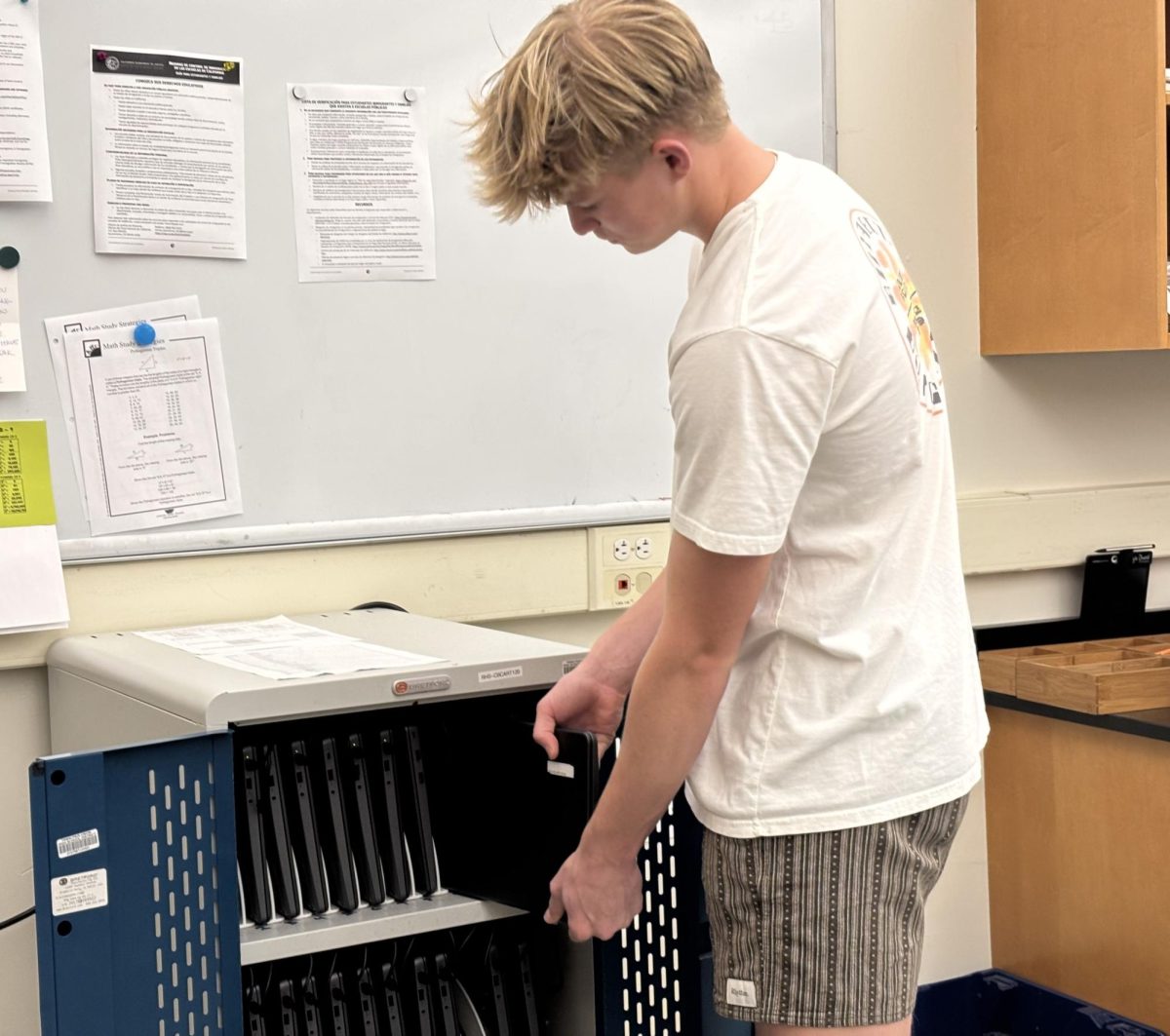Last semester, some sophomore PE students were required to download and use an app that tracked their daily calorie intake as part of the nutrition unit. The use of the app sparked controversy among some who felt that the app influenced students to adopt unhealthy eating habits, despite teachers’ positive intentions of integrating the app into the curriculum.
The intention of the assignment was to show students how their eating habits compare to what is considered healthy based on body composition, according to PE teacher Byron Nelson, one of the two teachers who integrated the app into the nutrition curriculum.
The teachers told the sophomores to track their calories using either MyFitnessPal or Livestrong for four days. Students were graded based on the completion of tracking their calories during the four-day span, and were not marked down based on the number of calories eaten.
The most recent version of MyFitnessPal requires users to choose whether they want to gain, maintain or lose weight, and tracks the number of calories needed to reach this goal. Livestrong only gives the option to maintain weight if the user creates an account, which the sophomores were required to do. If a student didn’t have a smartphone, they were instructed to log their data using a tablet or a computer, according to Nelson.
“The way I approached it, it wasn’t about calorie tracking or weight. Weight is a terrible measurement to use for anything. Body mass index, body mass percentage, muscle weight are all good benchmarks to use,” Nelson said. “We just used weight as a way to figure out what each student needed.”
Nelson made an effort to emphasize to his students the importance of maintaining weight for the sake of the project.
“I said that if you have a goal you are trying to do personally, I’m not going to tell you what to do. For the project, you wanted to keep it on maintain [weight] so that all the standards are for where you’re at now,” Nelson said.
During the nutrition unit, PE teacher leader Heather Long was unaware of the use of the apps, but in a recent interview, she said she felt they were a positive way to support the understanding of the nutrition unit.

“I don’t see anything wrong with using the app because it’s just a tool for students to be mindful of what they’re eating,” Long said. “I don’t think the app is prescriptive to everyone. It’s more of a general outline of what you should be eating on a daily basis.”
Although the teachers meant for the project to be positive, it upset some students. After a couple of days using the app, some felt that the app influenced them to eat less to fit the recommended calories for each meal, according to students in Lloyd and Nelson’s classes.
“I started going way above the calorie intake that I should have and be expected to have, so I felt really bad about myself,” said sophomore Claire Birchenough, who chose to maintain her weight for the assignment and felt the app influenced her to adopt unhealthy eating habits.
Sophomore Violet Loo, a student of Lloyd’s class, said that when her classmates were first given the assignment, some girls immediately thought the project was urging students to lose weight.
Similar to her peers, Loo saw both a positive and negative side to the assignment.
“It did help. I was like, ‘Oh, wow there’s a lot of calories in this,’” Loo said. “But at the same time, it’s not sending the right message for most people.”
According to Loo, many of her peers made light of the app and the assignment, but other students felt that the app was harmful because it monitored what they were eating so intensely.
“I definitely cut back a lot of what I was eating,” Loo said. “I didn’t eat as much and I paid a lot of attention to the calories I was eating.”
Loo said she showed MyFitnessPal to her cousin, who has suffered from eating disorders throughout her life, after the nutrition unit ended. Her cousin was surprised to hear that students were required to download the app as part of the curriculum.
“When I showed her we had to download that app she was astonished,” Loo said. “Almost every girl in her rehabilitation camp had [MyFitnessPal] and that was the reason they started to cut back their calories,” Loo said.
Loo’s cousin made Loo remove the app from her phone.
Katy Litwack, operations manager of Beyond Hunger, a company that strives to treat, educate and improve the lives of those with eating disorders, said there are both positive and negative aspects of using calorie-tracking apps.
“The concept is good to be able to get more information, but what happens is it becomes more of a tool that feeds your own mental obsession about your body and your weight and self esteem,” Litwack said.
Not everyone needs the same amount of exercise, even when they have the same weight, which changes the types of foods and the number of calories they should be eating, according to Litwack.
“When you have an application that tracks certain things, it doesn’t really take into account your genetic factors, and the deeper biological factors of your body and your body’s needs,” Litwack said.
Although Livestrong does ask users to report their activity levels when entering body composition, Birchenough felt the calories didn’t accurately reflect how much she should be eating.
“I swim a lot, so I eat a lot more than other girls do,” Birchenough said. “The app gives a calorie intake that you should be maintaining, and I was going over that so I felt like I had to lie about what I was eating.”
During the first couple days, Birchenough said she thought about cutting back on her calories, but knew she couldn’t because it was crucial to eat more for swimming than the app was recommending. Birchenough decided instead to input “healthy meals” that she found on the internet, most of which she never actually cooked or ate.
Birchenough never considered approaching Nelson with her doubts about the project.
“None of my students approached me with any concerns or wrote about it in the final write-up for the project,” Nelson said.
Although some students thought negatively about the app, sophomore Jack Green had a positive experience as he began eating healthier and learning about specific types of food he needed to cut back on or eat more. Green chose to maintain his weight.
“It was cool to see the different kinds of food I was eating and how that stacked up against the foods that I should be eating,” Green said. “It was an interesting exercise for me to take a step back.”
Although the unit influenced Green to positively change his eating habits, he also thought it would be hard for other students to do the same in a limited amount of time.
Green said he knew of several students who were eating significantly more than the recommended calorie amount and faked their calorie count so they wouldn’t get a bad grade for the assignment.
“I think a lot of people didn’t want to see what they were eating,” Green said.
Since the assignment, Green has made an effort to eat healthier and cook more meals for himself and his family.
Members of the Body Positive Club were particularly upset about this assignment. The club aims to look at all the messages people receive about body image and filter them, a goal it called “reclaiming health.” Senior Alison Wood and freshman Sally Noble, members of the club, thought the app promoted a negative message about being healthy.
Wood decided to take up the issue with principal David Sondheim, who referred her to the PE department. Wood has not yet followed up with the PE department to express her concern about the apps.
Wood said there are better ways to have students look at their eating habits than by having them track their calories.
“I think it could be so much better served if they had students write a list of the foods that they eat,” Wood said. “Some sort of thing where they don’t have to track their calories or track their weight because it can be so harmful.”
Additionally, Noble felt that the use of the apps were not the best way to measure a person’s health.
“Just because you have the same height and weight and daily activities as someone else, doesn’t mean you should be eating the exact same thing,” Noble said.
Noble suggested the class could have benefitted from a unit about self-love rather than monitoring calories because of the prevalence of eating disorders in Marin.
“I am definitely open to approaching things from a different angle to meet the needs of the students and I will always make individual adjustments where they are needed, but I do not want to sacrifice the benefits of the project either,” Nelson said.
Lloyd declined to comment.





